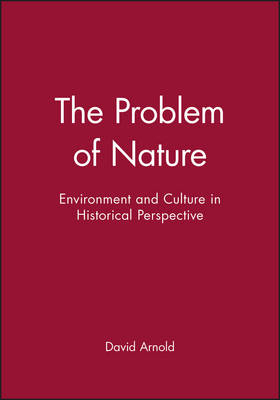
The Problem of Nature
Environment and Culture in Historical Perspective
Seiten
1996
Wiley-Blackwell (Verlag)
978-0-631-19021-9 (ISBN)
Wiley-Blackwell (Verlag)
978-0-631-19021-9 (ISBN)
This work shows how historians, geographers and philosophers have invoked nature in its various manifestations - climate, topography, vegetation, wildlife and disease - as a dynamic force in human history. It covers a whole cycle of environmental history and its interpretation
This book considers how nature - in both its biological and environmental manifestations - has been invoked as a dynamic force in human history. It shows how historians, philosophers, geographers, anthropologists and scientists have used ideas of nature to explain the evolution of cultures, to understand cultural difference, and to justify or condemn colonization, slavery and racial superiority. It examines the central part that ideas of environmental and biological determinism have played in theory, and describes how these ideas have served in different ways at different times as instruments of authority, identity and defiance. The book shows how powerful and problematic the invocation of nature can be.
This book considers how nature - in both its biological and environmental manifestations - has been invoked as a dynamic force in human history. It shows how historians, philosophers, geographers, anthropologists and scientists have used ideas of nature to explain the evolution of cultures, to understand cultural difference, and to justify or condemn colonization, slavery and racial superiority. It examines the central part that ideas of environmental and biological determinism have played in theory, and describes how these ideas have served in different ways at different times as instruments of authority, identity and defiance. The book shows how powerful and problematic the invocation of nature can be.
David Arnold is Professor of South Asian History at the School of Oriental and African Studies, London. His previous books include Famine: Social Crisis and Historical Change and Colonizing the Body: State Medicine and Epidemic Disease in Nineteenth Century India.
Foreword. 1. Introduction.
2. The Place of Nature.
3. Reappraising Nature.
4. Environment as Catastrophe.
5. Crossing Biological Boundaries.
6. The Ecological Frontier.
7. The Environmental Revolution.
8. Inventing Tropicality.
9. Colonizing Nature.
Conclusion.
Guide to Further Reading.
Index.
| Erscheint lt. Verlag | 23.8.1996 |
|---|---|
| Reihe/Serie | New Perspectives on the Past |
| Verlagsort | Hoboken |
| Sprache | englisch |
| Maße | 153 x 228 mm |
| Gewicht | 312 g |
| Themenwelt | Geisteswissenschaften ► Geschichte ► Geschichtstheorie / Historik |
| Geisteswissenschaften ► Geschichte ► Teilgebiete der Geschichte | |
| Naturwissenschaften ► Biologie ► Ökologie / Naturschutz | |
| ISBN-10 | 0-631-19021-X / 063119021X |
| ISBN-13 | 978-0-631-19021-9 / 9780631190219 |
| Zustand | Neuware |
| Haben Sie eine Frage zum Produkt? |
Mehr entdecken
aus dem Bereich
aus dem Bereich
Russland, die Ukraine und der Westen
Buch | Softcover (2024)
De Gruyter (Verlag)
39,95 €
Geschichte und Theorie
Buch | Softcover (2024)
De Gruyter Oldenbourg (Verlag)
24,95 €
wie Irritationen historisches Denken anregen
Buch | Softcover (2024)
Kohlhammer (Verlag)
69,00 €


